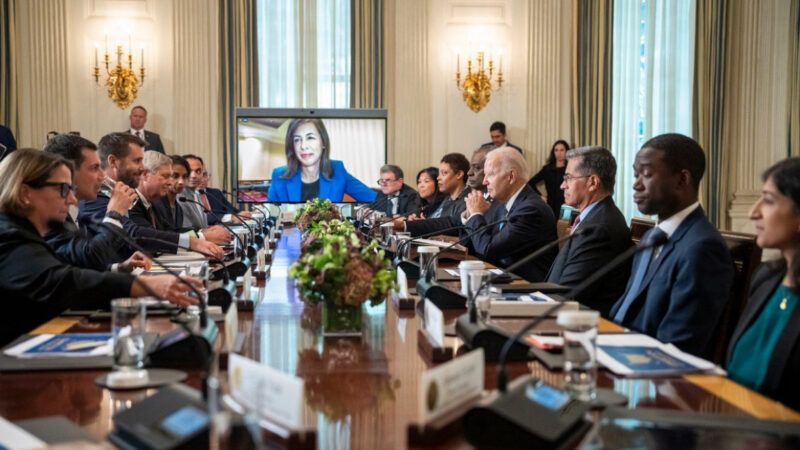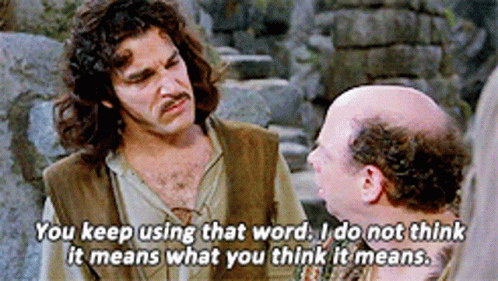Biden Declares War on 'Junk Fees,' but There's (Thankfully) Not Much He Can Do About Them
Plus: Lessons from the recovered memory movement, Texas fights to keep young adults from owning handguns, and more...

The Biden administration has declared war on what President Joe Biden describes as "junk fees." These include things like bank overdraft fees, late fees for credit cards, and fees for add-on airline services like checking bags or choosing your seat.
Government-mandated "competition." Biden has nonsensically portrayed government meddling with such fees as a boon for the free market.
"That's competition," he said at a September 26 meeting of the White House Competition Council, which has made eliminating "junk fees" part of its antitrust purview. Of course, outside of the Biden admin's fantasy world, free market competition has nothing to do with government mandating or pressuring entire industries to do its bidding.

And, sure, no one likes the sorts of fees Biden describes. Avoiding such fees might save some people some cash in the short term. But there are good reasons why businesses charge many of these fees, and doing away with them will surely impose other costs, especially on low-income consumers.
Unintended consequences. For instance, banks may make up for the loss of overdraft and bounced check fees by charging fees for opening a checking account, by requiring higher amounts for an opening deposit, or by mandating higher minimum account balances. All of these things could hurt the ability of low-income consumers (many of whom may never have overdrawn an account) to open a checking account in the first place and exacerbate America's problem of people being "unbanked" and having to rely on (fee-heavy) services from check-cashing shops.
Credit card companies charge late fees to encourage people to pay their balances on time. A lack of late fees may encourage people to let balances linger longer—thereby racking up more interest fees and a bigger debt balance over time. And credit card companies may make up for late fees by raising interest rates or simply rejecting more applications.
I could go on, but the point is clear: there are always unintended consequences to the government intervening in markets. The government is not a magical being that can simply do away with debts or expenses that people don't like while creating zero reverberating effects.
Big talk, little change. The good news here is that Biden's war on junk fees is limited by the fact that the executive branch has no authority to simply declare these fees illegal. So the administration is stuck tinkering around the margins or talking big while taking steps that don't actually do much at all.
For instance, when it comes to air travel, the Department of Transportation has declared that airlines must disclose upfront fees for things like checked bags, seat selection, or the ability to change your flight. At present, these fees don't generally become apparent until one is already starting the booking process (but before one finalizes it and pays).
The new way will alert people to fees a little earlier in the process, and perhaps even make some people choose one flight over another—though considering just about every airline charges these fees, the latter seems unlikely. But it doesn't actually stop such fees from existing or lower the amount airlines charge… and that's a good thing. Airlines charging a premium for certain services helps keep baseline ticket prices lower. Ending add-on fees could simply push up the price of flying across the board.
Things are similar when it comes to internet service fees. The president can't actually declare these fees illegal. So for all the big talk about saving consumers money on these fees, all that's actually in play is a Federal Communications Commission directive that says "internet companies [must] display a standardized 'Broadband Nutrition Label' that discloses their monthly prices, fees, and internet speeds—so customers can see which company is cheapest and companies will have to compete for business."
Most—if not all—internet companies already disclose this information. But now they have to disclose it in the form of a nutrition label. Don't you feel the inflation shrinking?
People are portraying all of these moves as an "end" to "junk fees." But the only change to fees themselves comes with banks, and here Biden was about cryptic about what role the government played.
"Thanks to our efforts so far, three-quarters of the country's 20 largest banks are … getting rid of fees for bounced checks," Biden said Monday. "And if we do all this, we're on track to lower overdraft fees—catch this. I know the right departments know this. But lower overdraft fees by 50—or, excuse me, by $3 billion a year—$3 billion a year … for primarily middle-class and lower-middle-class families who are paying, because they're the ones usually—are the ones in a position that bounce on a check."
FREE MINDS
Journalist Ethan Watters looks at "the moral panic engendered by the recovered memory movement in the 1980s and early 1990s … a time when therapists proudly advertised their ability to help clients unearth supposedly repressed memories of childhood sexual abuse." It was later revealed to be junk science, but not before ruining a lot of lives. What's astonishing now is how widespread belief in recovered memory was:
The belief that such memories could be repressed and then recovered through special techniques was widespread among mental health professionals for well over a decade. In books and on television, therapists portrayed themselves as the first generation of healers to understand both these mechanisms of repression and how to unlock them without contaminating the story that emerged. The results were dramatic: Patients often recovered abuse memories that began in infancy and lasted for decades. Some came to believe not only that they had repressed memories but also that their minds had fractured into many personalities to manage the pain and betrayal.
With a few decades' perspective, it's clear this level of confidence led to disastrous results. In 2005 a Harvard psychology professor, Richard McNally, called the recovered memory movement "the worst catastrophe to befall the mental health field since the lobotomy era."
Watters worries that we're beginning to forget the lessons of this era (or maybe never learned them fully enough):
Unfortunately, many of the mistaken assumptions about memory and trauma remain part of popular culture. Among clinical psychologists, the belief that the unconscious mind can block out memories of trauma is commonplace. Memory researchers and scientists, for the most part, remain highly skeptical. In 2019 a group of seven memory scientists, including Dr. Loftus, concluded that therapists were still using techniques that had the potential for creating false memories and that the practice continued to pose a substantial risk, "potentially leading to false accusations and associated miscarriages of justice," they wrote. While the so-called memory wars rage on over the issue of repression, clinicians and their professional organizations have largely "feigned forgetfulness" of the recovered memory movement's excesses, as the author and psychology professor Richard Noll once wrote.
Recently, I spent an afternoon watching various TikTok channels under the hashtags #recoveredmemory and #dissociativeidentitydisorder. The ideas and themes I heard, mostly from young adults, were disturbingly familiar. Belief in memory repression and the idea that the mind can split into dozens of distinct personalities are alive and well. Across social networking sites, I also found a maelstrom of information, opinion and conversation about mental health topics, including Tourette's syndrome, gender dysphoria, attention deficit disorder, self-harm, eating disorders, anxiety, depression and suicide. The internet as we know it didn't exist during the rise of recovered memory therapy, but it is a powerful cultural force now and may be ground zero for the creation of new symptom pools, new looping effects and new ways of being.
FREE MARKETS
Texas fights to keep young adults from owning handguns. Texas is appealing a judge's ruling that the state can't prohibit 18- to 20-year-olds from owning handguns. "Last week, Attorney General Ken Paxton's office filed a notice of an appeal of the ruling on behalf of the Texas Department of Public Safety," The Texas Tribune reports.
It came almost a month after U.S. District Judge Mark Pittman, who was appointed to the bench by former President Donald Trump, issued the original ruling on Aug. 25, writing that the Second Amendment protects all adults' right to bear arms without an age limit. The suit was brought on by two plaintiffs within the 18-20 age range and the Firearms Policy Coalition Inc. against Texas, which has a law on the books setting the legal age at which people can carry handguns at 21.
QUICK HITS
Very thoughtful thread on the great realignment on the right, which concludes basically by calling for the same thing on the left — an alliance of the people whose forbears were communists with the old anti-communist left. https://t.co/foXOWVzmRc
— Ben Smith (@semaforben) September 27, 2022
• The Congressional Budget Office (CBO) estimates that Biden's student loan debt forgiveness plan will cost $400 billion.
• Florida's Republican Gov. Ron DeSantis "is painting himself and his party into a corner—where the only acceptable position will be rejecting the principle of asylum entirely," writes immigration reporter Dara Lind. (See also: "For Florida Gov. Ron DeSantis, Political Stunts Are More Important Than Substance.")
• "For the third time in five years, a judge has struck down the Iowa Legislature's efforts to criminalize the use of cameras in agriculture facilities and other businesses," notes the Iowa Capital Dispatch.
• Former President Donald Trump's claims that he declassified any classified documents found at Mar-a-Lago are "both implausible and, in the context of the potential crimes that the FBI is investigating, legally irrelevant."
• Same-sex marriage is now legal in Cuba.


Show Comments (279)